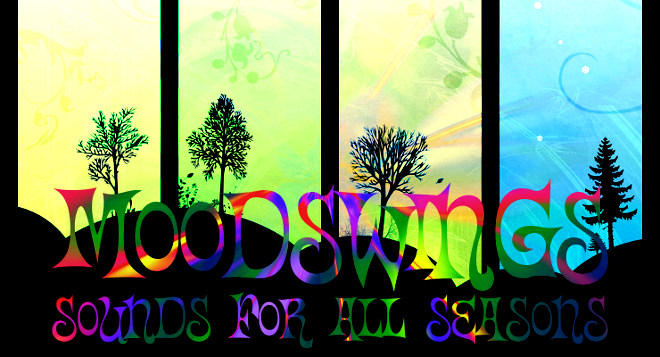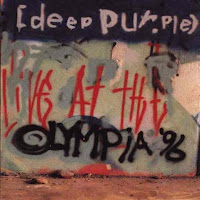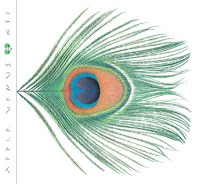
CHRISTMAS MEGAPOST:
PETER HAMMILL'S DISCOGRAPHY
1973-1986
Born Peter Joseph Andrew Hammill, November 5, 1948, in Ealing, London, to parents of fairly good means, Peter Hammill grew up in the embrace of Jesuit teachings, an element that has continued to affect and influence his songwriting throughout his career as much as his studies of philosophy and art. The drive of his particular muse, fueled additionally by the '60s groundswell of new approaches to science fiction (the so-called "New Wave," with Michael Moorcock, Thomas Disch, Harlan Ellison, and others leading the charge, and ex-Deviants leader Mick Farren on its heels) led to collaboration with Chris Judge-Smith at Manchester University, with Van Der Graaf Generator forming around them -- albeit briefly.
The band broke up after a number of gigs, with Hammill going solo. The arrival of a Mercury Records contract led Hammill into the studio, accompanied by various friends, for a brief but intense recording session. Within a matter of hours, Van Der Graaf Generator was reborn, though minus Judge-Smith, and the band had begun to develop the studio relationship with producer John Anthony that would serve them for the next few albums. The basic monolithic VDGG had not yet come about, but Hammill's writing was already setting the tone -- splintered personalities facing the darkness, cosmic secrets just beyond reach, thresholds beyond which lurk sudden death, light-hearted topics one and all. Even their one single, "People You Were Going To," is essentially a jolly happy romp of a tune with a tone of despair beneath. Hammill would later re-record the song for Nadir's Big Chance.
The new band lineup had its own share of uncertainties, with bassist Keith Ellis departing for an unceremoniously brief stint in Uriah Heep. With new bassist/guitarist Nic Potter in tow, VDGG joined Genesis in signing with Anthony Stratton-Smith's new Charisma label. By this point Hammill had begun to refine his songwriting into longer and more ornate forms, with very good results, with his themes touching on twin points of science and mysticism, with the occasional sidestep into more down to earth territory. The first three VDGG albums for Charisma moved through a variety of shattered and darkened landscapes, with some genuinely chilling moments, such as the science-fiction outing "Pioneers Over C" and "Man-Erg," which attempted to address the dual nature of man in approximately 12 minutes flat.
Hammill's first solo outing, Fool's Mate (both a chess and Tarot reference), came alongside the Van Der Graaf Generator album H to He Who Am the Only One. It consisted, in the main, of an assortment of songs deemed too small for the band, material from his early solo days, and so on, items that he seemed to want to clear out of the way. His in-studio help included members of Lindisfarne, another Charisma signing, and Robert Fripp. In contrast, following the dissolution of VDGG following Pawn Hearts, Hammill's sophomore release, The Chameleon in the Shadow of the Night, was a bleak affair indeed. Hammill seemed to need to strip things down to the bare essentials, recording at home (the first appearance of Sofa Sound) for the most part, his lyrics telling more personal tales -- it's only with the concluding "The Black Room" that things sound familiar. Considering the presence of the rest of the band, and that this had originally been intended as a band song, it's hardly a surprise.
With The Silent Corner and the Empty Stage, Hammill began to find a voice away from VDGG, though his writing had yet to completely mature -- "Red Shift" is another cosmic charge, for example. On the other hand, the album sports several stunning tracks, including "Modern," "Wilhelmina," "Forsaken Gardens," and "A Louse Is Not a Home." In Camera saw him handling most of the instrumental work himself and experimenting with ambient soundscapes.
In 1975, he once again dug into the back catalog of his songs, assuming the leather-jacketed persona of Rikki Nadir for Nadir's Big Chance, a noisy, chaotic album of garage band-styled rock & roll. While not exactly the three-chord thrash outing Hammill seems to have wanted (it at least comes undone with the elegaic "Pompeii," if not with "The Institute of Mental Health, Burning"), the album seems to have had its effect in the British music community, being cited by more than a few in the following punk uproar as an influence -- even John Lydon went public with a degree of admiration for Hammill's work. The cult of adoration built up around Hammill has persisted for years, and is seemingly large enough, worldwide, to support him consistently.
1975 saw the rebirth of Van Der Graaf Generator in a somewhat calmer format, while the songs still extended to epic length, the tendency towards proto-jazz explosions with rock underpinnings had been shorn away, the drumming was more laid back, and the lyrics tended towards examinations of people (though the cosmic did make quite a return on Still Life with "Childlike Faith in Childhood's End," though this one had a narrative voice to it).
The first two releases, Godbluff and Still Life, were fine albums, with one of Hammill's finest songs, "My Room (Waiting for Wonderland)" appearing on the latter, but the third album, World Record indicated trouble ahead -- a fairly weak, lifeless release that appeared to have come from a band that had lost heart. Indeed it had. The band fractured yet again. Hammill took some time to record Over, an intense solo set going over the breakup of his long-standing relationship, performing a set of songs that alternately raged and offered up a bleak view of life. This set the stage for the next version of the band, now known just as Van Der Graaf, a short-lived effort that managed a single studio release, with a posthumous live album, acidly titled Vital, marking the official end of the band.
Hammill returned to his solo efforts again, initially choosing to record A Black Box by himself, but then adopting a band approach for a number of subsequent releases. By this point his writing had taken on a mature focus, with even the lengthier efforts eschewing the cosmic and mystical in favor of the personal focus, often with a darkly ironic twist. He is capable of being utterly sardonic while maintaining a poker face, a brother in spirit, sometimes, to Leonard Cohen. His ability to chart his own course fully stems from his choice to operate his own record label as an adjunct to his ever-improving studio operation -- it's this studio operation, in fact, that allowed him to return to and remaster the Van Der Graaf recordings in 2000, to produce The Box.
Enjoy and Merry Christmas to all!!!
 CHAMELEON IN THE SHADOW OF NIGHT (1973)
CHAMELEON IN THE SHADOW OF NIGHT (1973)
320 KBPS1. German Overalls
2. Slender Threads
3. Rock and Rôle
4. In the End
5. What's It Worth
6. Easy to Slip Away
7. Dropping the Torch
8. (In the) Black Room/Tower
 THE SILENT CORNER AND THE EMPTY STAGE (1974)
THE SILENT CORNER AND THE EMPTY STAGE (1974)
320 KBPS
1. Modern
2. Wilhelmina
3. The Lie (Bernini's Saint Theresa)
4. Forsaken Gardens
5. Red Shift
6. Rubicon
7. A Louse Is Not A Home
 IN CAMERA (1974)
IN CAMERA (1974)
320 KBPS1. Ferret and the Featherbird
2. (No More) the Sub-mariner
3. Tapeworm
4. Again
5. Faint-Heart and the Sermon
6. The Comet, the Course, the Tail
7. Gog Magog (In Bromine Chambers)
.
 NADIR'S BIG CHANCE (1975)
NADIR'S BIG CHANCE (1975)
320 KBPS1. Nadir's Big Chance
2. The Institute of Mental Health, Burning
3. Open Your Eyes
4. Nobody's Business
5. Been Alone So Long
6. Pompeii
7. Shingle
8. Airport
9. People You Were Going To
10. Birthday Special
11. Two or Three Spectres
 OVER (1977)
OVER (1977)
320 KBPS1. Crying Wolf
2. Autumn
3. Time Heals
4. Alice (Letting Go)
5. (This Side Of) The Looking Glass
6. Betrayed
7. (On Tuesdays She Used to Do) Yoga
8. Lost and Found
 THE FUTURE NOW (1978)
THE FUTURE NOW (1978)
320 KBPS
1. Pushing Thirty
2. The Second Hand
3. Trappings
4. The Mousetrap
5. Energy Vampires
6. If I Could
7. The Future Now
8. Still In The Dark
9. Mediaevil
10. A Motor-Bike In Africa
11. The Cut
12. Palinurus
 PH7 (1979)
PH7 (1979)
320 KBPS1. My Favourite
2. Careering
3. Porton Down
4. Mirror Images
5. Handicap and Equality
6. Not for Keith
7. The Old School Tie
8. Time for a Change
9. Imperial Walls
10. Mr. X (Gets Tense)
11. Faculty X
 A BLACK BOX (1980)
A BLACK BOX (1980)
320 KBPS1. Golden Promises
2. Losing Faith in Words
3. The Jargon King
4. Fogwalking
5. The Spirit
6. In Slow Time
7. The Wipe
8. Flight
 SITTING TARGETS (1981)
SITTING TARGETS (1981)
320 KBPS1. Breakthrough
2. My Experience
3. Ophelia
4. Empress's Clothes
5. Glue
6. Hesitation
7. Sitting Targets
8. Stranger Still
9. Sign
10. What I did
11. Central Hotel
 ENTER K (1982)
ENTER K (1982)
320 KBPS1. Paradox Drive
2. The Unconscious Life
3. Accidents
4. The Great Experiment
5. Don't Tell Me
6. She Wraps It Up
7. Happy Hour
Bonus track
8. Seven Wonders
 PATIENCE (1983)
PATIENCE (1983)
320 KBPS1. Labour of Love
2. Film Noir
3. Just Good Friends
4. Jeunesse Doree
5. Train Time
6. Now More Than Ever
7. Comfortable
8. Patient
 LOOPS & REELS (1983)
LOOPS & REELS (1983)
320 KBPS
1. A Ritual Mask
2. Critical Mass
3. The Moebius Loop
4. An Endless breath
5. In Slow Time
6. My Pulse
7. The Bells! The Bells!
 THE LOVE SONGS (1984)
THE LOVE SONGS (1984)
320 KBPS
1. Just Good Friends
2. My Favourite
3. Been Alone So Long
4. Ophelia
5. Again
6. If I Could
7. Vision
8. Don't Tell Me
9. The Birds
10. The Looking Glass
 SKIN (1986)
SKIN (1986)
320 KBPS
1. Skin
2. After the Show
3. Painting by Numbers
4. Shell
5. All Said and Done
6. A Perfect Date
7. Four Pails
8. Now Lover
 AND CLOSE AS THIS (1986)
AND CLOSE AS THIS (1986)
320 KBPS1. Too Many of My Yesterdays
2. Faith
3. Empire of Delight
4. Silver
5. Beside the One You Love
6. Other Old Chichés
7. Confidence
8. Sleep Now
BONUS!
 FIRESHIPS (1992)
FIRESHIPS (1992)
320 KBPS
1. I Will Find You
2. Curtains
3. His Best Girl
4. Oasis
5. Incomplete Surrender
6. Fireships
7. Given Time
8. Reprise
9. Gaia

(and a big thank you to Pierre for the "Loops & Reels"'s rip!)









































